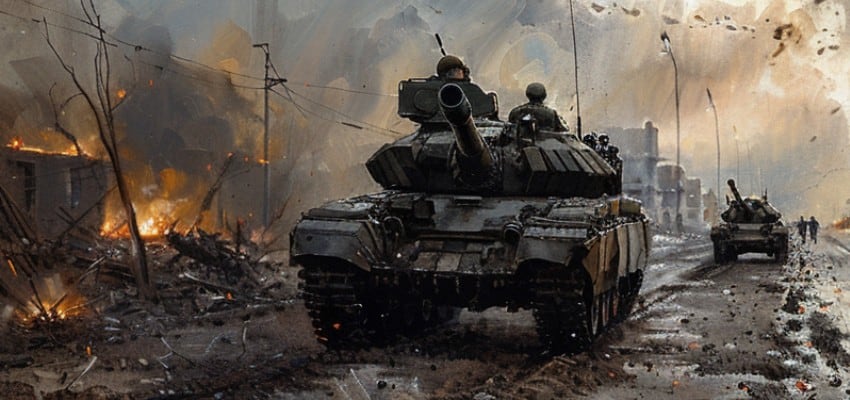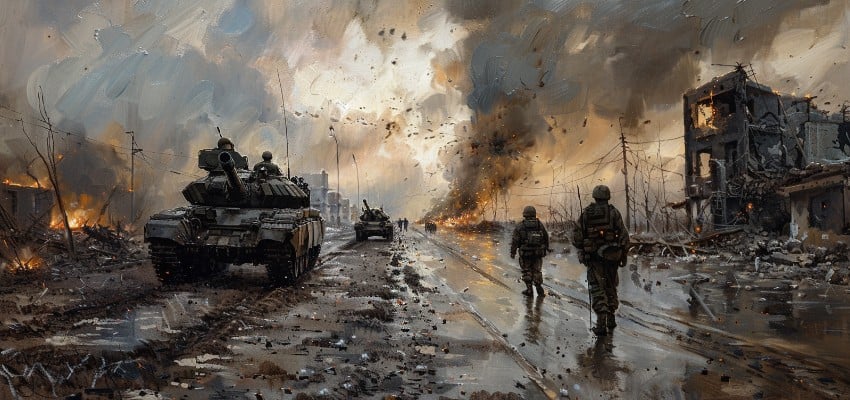Editor’s Note: The current state of the conflict in Ukraine underscores the complex interplay of military strategy, international diplomacy, and the flow of critical resources. As we analyze the events up to March 15, 2024, the emphasis on the strategic dynamics at play offers a clearer understanding of the immediate and future challenges that both Russian and Ukrainian forces face. The detailed assessment of ongoing Russian offensives, particularly their concentrated efforts west of Avdiivka, sheds light on the tactical and operational considerations driving the conflict.
Western security assistance to Ukraine is highlighted as a pivotal element, influencing the capacity of Ukrainian forces to defend their country and potentially shape the course of the conflict. The analysis of the delays and challenges associated with this assistance provides insight into the broader implications for the stability of Ukrainian defensive lines and the prospects for future engagements.
This report not only addresses the immediate concerns of the conflict but also situates these events within the larger context of European security and NATO’s strategic interests. Through a comprehensive understanding of these dynamics, we aim to inform the discourse on one of the most significant geopolitical challenges of our time, emphasizing the importance of continued support for Ukraine in its defense against aggression.
Source Note: One of the most accurate and detailed sources for ongoing updates on the Ukraine crisis is the Russian Offensive Campaign Assessment from the Institute for the Study of War. The Institute for the Study of War (ISW) is a 501(c)(3) organization and produces strictly non-partisan, non-ideological, fact-based research. ISW seeks to promote an informed understanding of war and military affairs through comprehensive, independent, and accessible open-source research and analysis. ISW’s research is made available to the general public, military practitioners, policymakers, and media members. Providing a daily synthesis of key events related to the Russian aggression against Ukraine, ISW updates may benefit investigators and litigators as they follow the business, information technology, and legal trends and trajectories impacted by and stemming from the current Russo-Ukrainian conflict.
For those seeking to grasp the full scope of this evolving landscape, the complete updates from the Institute for the Study of War serve as an invaluable resource.
Content Assessment: Russian Forces Prepare for Summer 2024 Offensive as Ukraine Faces Critical Shortages, Experts Warn (March 15, 2024)
Information - 92%
Insight - 90%
Relevance - 86%
Objectivity - 88%
Authority - 90%
89%
Good
A short percentage-based assessment of the qualitative benefit expressed as a percentage of positive reception of the recent Russo-Ukrainian conflict update from ComplexDiscovery OÜ.
Russo-Ukrainian Conflict Update*
Russian Forces Prepare for Summer 2024 Offensive as Ukraine Faces Critical Shortages, Experts Warn (March 15, 2024)
ComplexDiscovery Staff
Russian forces are likely to maintain their offensive operations in eastern Ukraine this spring while preparing for a new large-scale offensive in the summer of 2024, according to military analysts and intelligence officials. The success of Ukraine’s defense against these offensives will largely depend on the timely provision of Western security assistance to address critical materiel shortages, particularly in air defense systems and missiles.
Reports from the frontlines indicate that Russian forces are concentrating their efforts on advancing west of Avdiivka before Ukrainian forces can establish more robust defensive lines. Ukrainian Commander-in-Chief Colonel General Oleksandr Syrskyi stated that Russian forces are conducting daily mechanized and infantry assaults to break through Ukrainian defenses in the area. Although Ukrainian forces have recently slowed Russian advances west of Avdiivka, pervasive materiel shortages caused by delays in Western security assistance are forcing Ukraine to prioritize limited resources to critical sectors of the front, increasing the risk of a Russian breakthrough in less-well-provisioned sectors and making the overall frontline more fragile than it appears.
EU High Commissioner Josep Borrell and other Western officials have emphasized the need to increase and expedite support for Ukraine, noting that the coming months will be decisive ahead of the anticipated Russian summer offensive. A senior US official warned that there is no “bright” future for Ukraine if the US does not pass the supplemental aid package, while a senior advisor to Ukrainian President Volodymyr Zelensky cautioned that Russian forces are highly likely to make significant territorial gains in Summer 2024 without US aid. Carnegie Endowment for International Peace’s Michael Kofman assessed that the US supplemental aid package would allow Ukrainian forces to “buy time,” but Ukraine must also address the “structural problem” related to its limited manpower resources.
Pressing shortages in air defense systems and missiles pose another significant challenge for Ukraine. Ukrainian policymakers have conveyed to Western officials that Ukraine may exhaust some of its air defense systems by the end of March, potentially forcing them to target only one out of every five Russian missiles launched at Ukrainian rear cities, down from the current ratio of four out of five. This 60 percent reduction in Ukraine’s ability to target and shoot down Russian missiles will further exacerbate the allocation issues between defending rear population areas and frontline positions. Experts assess that the US remains the only immediate source of necessary air defense systems like Patriots.
Intelligence officials also warn that the Russian military is adapting and learning from its experiences in Ukraine, with the potential to scale these lessons to prepare for a long-term confrontation with NATO. Director-General of the Estonian Foreign Intelligence Service Kaupo Rosin stated that Russia is restructuring and expanding its military in anticipation of a possible war with NATO within the next decade. While Russian adaptations through mass, such as manpower-intensive “meat assaults,” have been notable, the Russian military has also demonstrated an uneven propensity for operational, tactical, and technological innovation and learning, as seen in their relatively successful defensive effort against the Ukrainian summer 2023 counteroffensive in western Zaporizhia Oblast.
As the war in Ukraine continues, senior European officials stress that a Russian victory would pose a strategic threat to NATO security. EU High Commissioner Josep Borrell described such an outcome as an “unbearable” security cost to Europe and the United States, while French President Emmanuel Macron emphasized that a Russian victory in Ukraine would diminish European security and that Europe should be prepared to ensure Russia never wins the war. Macron also stated that he is not ruling out sending Western troops to Ukraine, but the current situation does not require it.
The outcome of the war in Ukraine will have far-reaching implications for European security and the future of NATO. As Russian forces prepare for their upcoming offensives, the timely provision of Western security assistance to Ukraine will be crucial in determining the course of the conflict and the security landscape of Europe in the years to come. Russian Security Council Deputy Chairperson Dmitry Medvedev’s recent questioning of Latvia’s sovereignty and threats against Latvian President Edgars Rinkēvičs further underscore the Kremlin’s ideological framing of the war in Ukraine as part of Russia’s longer-term conflict with the West and NATO.
News Sources
- Institute for the Study of War (understandingwar.org)
- Zelensky Warns Against Ceasefires as Fighting Rages in Ukraine (March 8, 2024)
As a leading source for cybersecurity, information governance, and legal discovery insights, including international investigations and litigation, ComplexDiscovery OÜ recognizes the importance of awareness regarding alleged and documented criminal acts, particularly in the context of the Russia-Ukraine conflict. While we, following the lead of the Institute for the Study of War (ISW), do not provide detailed coverage of war crimes in our primary reports, we encourage professionals within the eDiscovery ecosystem to stay informed about these activities. This awareness is crucial for understanding potential future legal actions and responsibilities.
Detailed Reporting with Maps for March 15, 2024, from the ISW – Mouseover to Scroll
2024-03-15-PDF-Russian Offensive Campaign Assessment-UpdateReview the Detailed Reporting and Maps PDF
About the Institute for the Study of War Research Methodology
ISW’s research methodology relies on both primary and secondary sources, enabling researchers to develop a comprehensive understanding of the situation on the ground. In order to analyze military and political developments in any given area, ISW’s research analysts must wholly understand the systems of enemy and friendly forces. They must also understand the population demographics, physical terrain, politics, and history of that area. This lays the analytical foundation for understanding the reasons for particular developments and fulfilling their assigned research objectives. ISW analysts also spend time in places like Iraq, Afghanistan, and elsewhere in order to gain a better understanding of the security and political situation and to evaluate the implementation of current strategies and policies. Our researchers compile data and analyze trends, producing a granular analysis of developments in areas of research, producing an accurate, high-resolution, timely, and thorough picture of the situation. ISW’s research methodology guarantees its success and commitment to improving the nation’s ability to execute military operations, achieve strategic objectives, and respond to emerging problems that may require the use of American military power.
About the Institute for the Study of War
The Institute for the Study of War advances an informed understanding of military affairs through reliable research, trusted analysis, and innovative education. We are committed to improving the nation’s ability to execute military operations and respond to emerging threats in order to achieve U.S. strategic objectives. ISW is a non-partisan, non-profit, public policy research organization.
Learn more, get involved, and contribute today.
Additional Reading
- From Dissent to OSINT? Understanding, Influencing, and Protecting Roles, Reputation, and Revenue
- [Annual Update] International Cyber Law in Practice: Interactive Toolkit
- Data Embassies: Sovereignty, Security, and Continuity for Nation-States
Assisted by GAI and LLM Technologies
* Sourced and shared with direct express permission from the Institute for the Study of War (ISW).
Source: ComplexDiscovery OÜ























